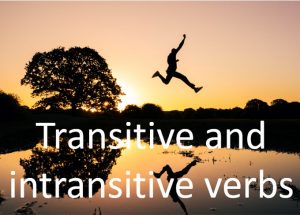Transitive and intransitive verbs have different rules when you use them to make sentences.
1. The boss surprised his workteam. TRANSITIVE VERB
2. The boss smiled. INTRANSITIVE VERB
Transitive verbs
A transitive verb needs a direct object to make a complete sentence.
For example:
She likes. (Incorrect)
She likes ice cream. (Correct)
I have invited. (Incorrect)
I have invited him. (Correct)
The verb ‘like’ needs a direct object – in these examples ‘icecream’ (noun) and ‘him’ (pronoun) to make sense and to form a complete sentence. The direct object of a transitive verb is something that ‘receives the action’ of that verb.
Intransitive verbs
An intransitive verb does not take a direct object. For example:
He arrived. (Correct)
You can add more information to the sentence above.
For example: ‘He arrived half an hour late’.
‘half an hour late’ is NOT the direct object of ‘arrived’ though. It is a noun phrase that acts as an adverb. It doesn’t ‘receive the action’, it adds extra information by describing when the man arrived.
More information about transitive and intransitive verbs
Some verbs can act as both transitive and intransitive verbs.
For example:
The All Blacks won. Correct (this sentence is grammatically complete)
The All Blacks won the Rugby World Cup. Correct (the Rugby World Cup is the object of the verb ‘won’)
Some transitive verbs can be followed by two objects (one direct and one indirect object).
For example:
- Sam bought Jane some chocolates.
- Send me the report when you’ve finished it.

